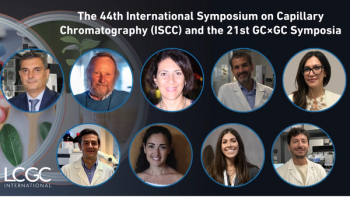
Separation Sciences
The first presentation in this Tuesday morning session will be given by Tadeusz Gorecki of the University of Waterloo and is titled “Comprehensive Multidimensional Separations: Can They Get Better?” Gorecki will discuss both GCxGC and LCxLC separations and will present examples of both approaches.
Session 870
Room 308B
10:05-11:25 a.m.
The first presentation in this Tuesday morning session will be given by Tadeusz Gorecki of the University of Waterloo and is titled “Comprehensive Multidimensional Separations: Can They Get Better?” Gorecki will discuss both GCxGC and LCxLC separations and will present examples of both approaches.
Next, Yuki Hiruta of Keio University will present a talk titled “Antibody Purification Using Temperature-Responsive Hydrogel Modified Silica Beads.” This presentation will describe a purification method for proteins such as monoclonal antibodies that involves the use of a solid-phase extraction system that enables control of elution behavior by adjusting the temperature of an aqueous eluent with neutral pH.
The next presentation, to be given by Muhammad Zahid of the University of Agriculture Faisalabad, Pakistan, is titled “Enhanced Extraction of Bioactive Components from Aloe barbadensis Miller Using Environmental Friendly Deep Eutectic Solvents.” Deep eutectic solvents are emerging green solvents that can be used for highly efficient extraction of natural products from plant biomass. They can also be used as safe extraction media for bioactive compounds used in applications such as cosmetics, food flavors, and pharmaceuticals.
The session’s final presentation, titled “From a Pit to a Ladder: Strategies and Techniques for Improved Biomacromolecule Separations,” will be given by Cory E. Muraco of MilliporeSigma. This presentation will discuss selected aspects of size-exclusion, hydrophobic interaction, ion-exchange, hydrophilic interaction, and reversed-phase chromatography, as well as the development of robust and reproducible analytical chromatographic schemes for separating protein and antibody mixtures.
Newsletter
Join the global community of analytical scientists who trust LCGC for insights on the latest techniques, trends, and expert solutions in chromatography.




